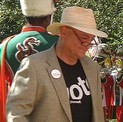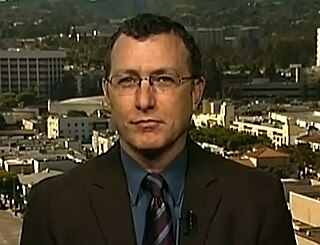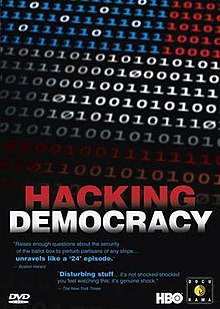Premier Election Solutions, formerly Diebold Election Systems, Inc. (DESI), was a subsidiary of Diebold that made and sold voting machines.
Electronic voting is voting that uses electronic means to either aid or take care of casting and counting ballots including voting time.
Bev Harris is an American writer, activist, and founder of Black Box Voting, a national, nonpartisan elections watchdog group. She helped popularize the term "black box voting", while authoring a book of that title.

Edward William Felten is the Robert E. Kahn Professor of Computer Science and Public Affairs at Princeton University, where he was also the director of the Center for Information Technology Policy from 2007 to 2015 and from 2017 to 2019. On November 4, 2010, he was named Chief Technologist for the Federal Trade Commission, a position he officially assumed January 3, 2011. On May 11, 2015, he was named the Deputy U.S. Chief Technology Officer. In 2018, he was nominated to and began a term as Board Member of PCLOB. Felten retired from Princeton University on July 1, 2021.

Election Systems & Software is an Omaha, Nebraska-based company that manufactures and sells voting machine equipment and services. The company's offerings include vote tabulators, DRE voting machines, voter registration and election management systems, ballot-marking devices, electronic poll books, ballot on demand printing services, and absentee voting-by-mail services.
A DRE voting machine, or direct-recording electronic voting machine, records votes by means of a ballot display provided with mechanical or electro-optical components that can be activated by the voter. These are typically buttons or a touchscreen; and they process data using a computer program to record voting data and ballot images in memory components. After the election, it produces a tabulation of the voting data stored in a removable memory component and as printed copy. The system may also provide a means for transmitting individual ballots or vote totals to a central location for consolidating and reporting results from precincts at the central location. The device started to be massively used in 1996 in Brazil where 100% of the elections voting system is carried out using machines.
The Volusia error was an incident that occurred during the 2000 United States presidential election in Florida.

Douglas W. Jones is an American computer scientist at the University of Iowa. His research focuses primarily on computer security, particularly electronic voting.

Ion Voltaire Sancho was an elected official who served Leon County, Florida, as Supervisor of Elections for 28 years, from 1989 to 2017. During his time in office, he was admired for his integrity as a voter advocate and elections expert, and became nationally known for his role in the Florida presidential election recount of 2000. He was also known for his appearance in the 2006 investigative documentary Hacking Democracy.
Dr. Herbert Hugh Thompson is a computer security expert, an adjunct professor in the Computer Science Department at Columbia University, and the Chief Technology Officer of NortonLifeLock. He is also the Chairman of RSA Conference the world's largest information security conference with over 25,000 attendees annually. Thompson is the co-author of a book on human achievement titled The Plateau Effect: Getting from Stuck to Success published by Penguin in 2013 and has co-authored three books on information security including, How to Break Software Security: Effective Techniques for Security Testing published by Addison-Wesley, and The Software Vulnerability Guide published by Charles River 2005. He is known for his role in exposing electronic voting machine vulnerabilities as part of the HBO Documentary Hacking Democracy. He was named one of the "Top 5 Most Influential Thinkers in IT Security" by SC Magazine and has been referred to by the Financial Times as "One of the world’s foremost cryptology and internet security experts."
The Hursti Hack was a successful attempt to alter the votes recorded on a Diebold optical scan voting machine. The hack is named after Harri Hursti.

Harri Harras Hursti is a Finnish computer programmer and former chairman of the board and co-founder of ROMmon, where he supervised in the development of the world's smallest 2-gigabit traffic analysis product that was later acquired by F-Secure Corporation.

Bradley Louis Friedman is an American blogger, journalist, actor, radio broadcaster, director and software programmer, most known for his criticism of election integrity issues in the United States. Friedman graduated from Interlochen Arts Academy in 1983 and received a BFA from New York University's (NYU) Tisch School of the Arts in 1988.
Simon Nicholas Knight Ardizzone is an editor and filmmaker. He produced and co-directed the documentary Hacking Democracy with Russell Michaels (2006) and co-directed Kill Chain: The Cyber War on America's Elections (2020) with Russell Michaels and Sarah Teale. He was an editor on the TV documentaries: God Is Green (2007); Britain's Greatest Monarch (2005); and What Made Mozart Tic (2004).
Election cybersecurity or election security refers to the protection of elections and voting infrastructure from cyberattack or cyber threat – including the tampering with or infiltration of voting machines and equipment, election office networks and practices, and voter registration databases.

Electronic voting in the United States involves several types of machines: touchscreens for voters to mark choices, scanners to read paper ballots, scanners to verify signatures on envelopes of absentee ballots, and web servers to display tallies to the public. Aside from voting, there are also computer systems to maintain voter registrations and display these electoral rolls to polling place staff.

Kill Chain: The Cyber War on America's Elections is an American television documentary film produced by Ish Entertainment, Blumhouse Productions and HBO Films. The film examines the American election system and its vulnerabilities to foreign cyberwarfare operations and 2016 presidential election interference. The film also features hackers at the conference DEF CON in their attempts to test the security of electronic voting machines.
Aggelos Kiayias is a Greek cryptographer and computer scientist, currently a professor at the University of Edinburgh and the Chief Science Officer at Input Output Global, the company behind Cardano.

Absolute Proof is a 2021 political film directed by and starring Mike Lindell. It was distributed by One America News Network and promotes the conspiracy theory that Donald Trump won the 2020 presidential election instead of Joe Biden. The documentary was removed by video hosting sites YouTube and Vimeo for violating their community standards.
Sarah Teale is a British-American documentary film producer and director, known for her Emmy nominated HBO documentaries Hacking Democracy, Dealing Dogs, The Weight of the Nation and Kill Chain: The Cyber War on America’s Elections.









